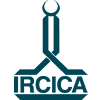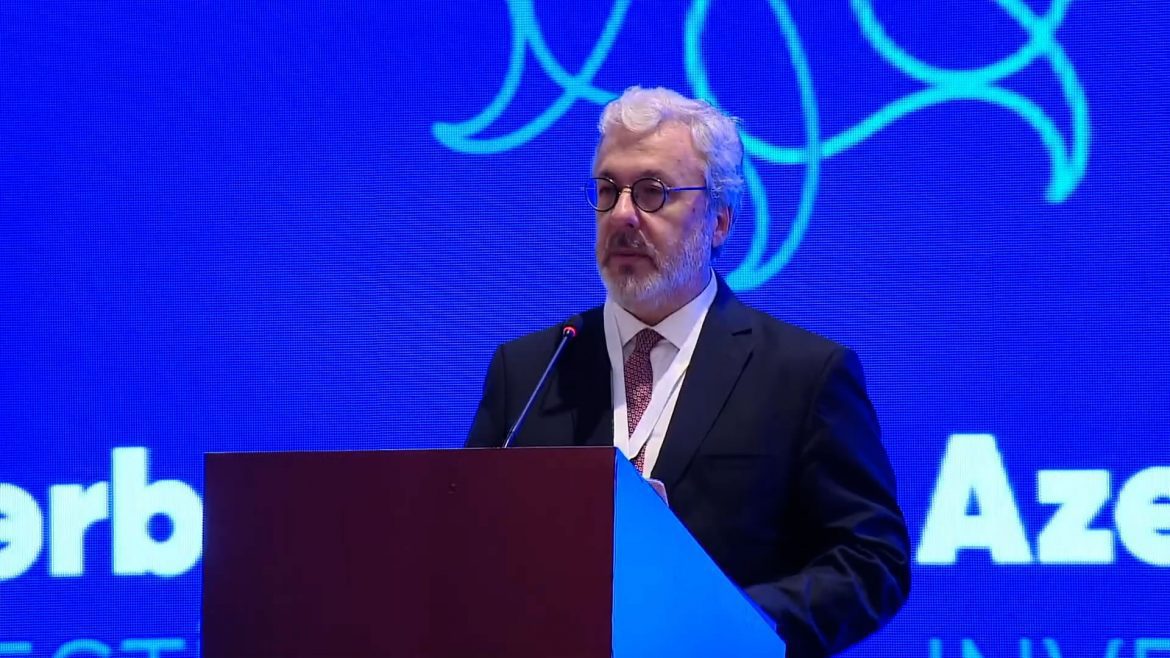The Director General of IRCICA Ambassador Prof. Dr. Mahmud Erol Kılıç addressed the Opening Ceremony of the Azerbaijan Investment and Culture Summit, which was organized by the Small and Medium Business Development Agency (SMBDA) of the Republic of Azerbaijan and the OIC-affiliate Islamic Cooperation Youth Forum (ICYF), with the support of the Ministry of Economy and the Ministry of Culture of the Republic of Azerbaijan, on 27-28 October 2021, in Baku. Prof. Dr. Kılıç also took the floor in the Panel titled “Main Social and Economic Challenges of the Region: Prospective from Nizami Ganjavi”.
The Summit was dedicated to the 880th anniversary of the well-known Azerbaijani intellectual and poet Nizami Ganjavi. It offered a platform for economic cooperation among the OIC Member States towards enhancing investments in Karabakh region and with focus on promoting youth entrepreneurship. The event brought together ministers, representatives of governmental and non-governmental economic and cultural institutions, international organizations, business and investment circles and youth economic associations from over 20 countries. The sessions were held in hybrid format.
The opening ceremony was addressed by: the Minister of Economy of Azerbaijan Mr. Mikayil Jabbarov; the Head of the Finance Office of the Presidency of Turkey Mr. Göksel Aşan; the Minister of Youth and Sports of Azerbaijan Mr. Farid Gayibov; the Head of the Investment Office of the Presidency of the Republic of Turkey Mr. Burak Dağlıoğlu; the President of the World Ethnosport Confederation Mr. Bilal Erdoğan; the President of the National Confederation of Entrepreneurs Organizations of Azerbaijan Mr. Mammad Musayev; the Deputy Minister of Industry and Technology of Turkey Mr. Çetin Ali Dönmez; the Director General of IRCICA Prof. Dr. Mahmud Erol Kılıç; the Chairman of SMBDA Management Board Mr. Orkhan Mammadov; the President of ICYF Mr. Taha Ayhan. Following these addresses, the Keynote Speech (pre-recorded) was delivered by Tun Dr. Mahathir Mohamad, 4th and 7th Prime Minister of Malaysia.
The Director General of IRCICA Prof. Dr. Kılıç evoked, in his address, the role of the cultural environment as a determining factor of international cooperation in general and investment promotion in particular. Outlining the mission and activities of IRCICA that help to reinforce the cultural sphere of cooperation among OIC Member States, the Director General cited as examples, some events conducted by IRCICA jointly with the Republic of Azerbaijan and which cover both the cultural and the economic aspects of development such as the conference on “Karabakh: history and heritage” held in Baku in 2016 and the “Baku International Festival for Crafts” organized in Baku in 2019.
The Summit program comprised eight panels, titled, respectively: “Potential Investments in Karabakh: Foreseeable Prospects”; “Resilient Start-up Ecosystem for Effective Post-Covid 19 Economic Recovery”; “Future Economic and Trade Prospects of OIC Region: Challenges and Opportunities”; “Main Social and Economic Challenges of the Region: Prospective from Nizami Ganjavi” (in partnership with Nizami Ganjavi International Center, Baku); “Cultural Dimension in Future Investments”; “Investment Boom for Start-ups; Financing Newly Developing Ventures”; “Sustaining Peace in the Region: Rebuilding Karabakh”; “Role of Technology Investment in Achieving SDGs”. Various exhibitions accompanied the panels.
Speaking at the Panel on “Main Social and Economic Challenges of the Region: Prospective from Nizami Ganjavi”, Prof. Dr. Mahmud Erol Kılıç said that references to illustrious intellectuals such as Nizami Ganjavi, who emphasized universally shared human values, contribute to building a conducive environment for cooperation in any area. Prof. Kılıç illustrated this relationship with examples of intra-OIC cooperation projects coordinated by IRCICA that encourage advancements in innovative production sectors such as arts, handicrafts and heritage preservation by drawing inspiration and sustainability from references to the common culture, shared history and civilization of Islamic countries.





